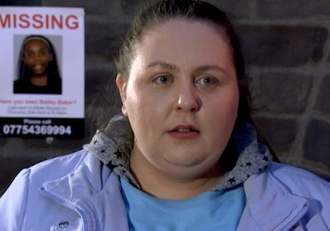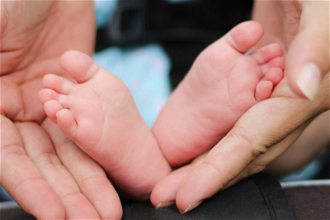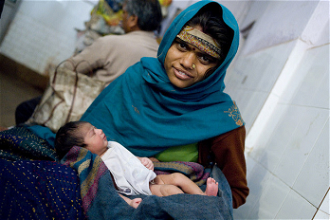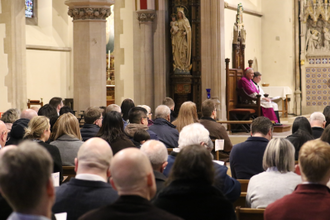EastEnders explores surrogacy

Clair Norris as Bernie. Photo credit: BBC
From racism to mental health, homophobia to domestic violence, the storylines of the BBC's long-running soap EastEnders have never shied away from contemporary social issues and usually covers them with sensitivity and realism.
For the last few weeks, the series has been exploring the theme of surrogacy, where a married couple, two former drug addicts: Rainie and Stuart Highway, played by Tanya Franks and Ricky Champ, unable to conceive naturally and unable to adopt under any legal parameter, look locally for a surrogate mother. Enter teenager Bernie Taylor, played by Clair Norris, the eldest daughter of an impoverished family, who in the past has suffered a chemical miscarriage. She needs the money to help her family out of financial difficulties.
Under pressure by Rainie to lose weight, she continues to take diet pills even after the insemination process, but stops taking them before carrying the baby full term.
After the little boy is born, she appears to regret her decision and is unsure whether she can hand over the child. Stuart struggles to bond with the baby....
Commercial surrogacy is prohibited in the UK but voluntary-altruistic surrogacy is permitted. If you make a surrogacy agreement it cannot be enforced by the law. If you use a surrogate, they will be the child's legal parent at birth. If the surrogate is married or in a civil partnership, their spouse or civil partner will be the child's second parent at birth, unless they did not give their permission. But legal parenthood can then be transferred by parental order or adoption after the child is born.
There are also surrogacy agencies. One London-based agency advertises the services of surrogate mothers in Cyprus, Mexico, Colombia, USA, Georgia and Ukraine (temporarily not available!). Fees vary, but the financial incentives can be attractive for for a woman in a poor country. Agencies also take their cut. In 2015, Thailand, India and Nepal outlawed commercial surrogacy following reports of the widespread exploitation of women.
Sister Imelda Poole IVBM who works in Albania fighting human trafficking and supporting women and girls caught up in this crime, with RENATE (Religious in Europe Networking Against Trafficking and Exploitation) said she had no personal experience of trafficked women in Europe being used for surrogacy, but she said: "Some Ukrainian women who had been hired for surrogacy by US couples were caught in the war and trapped in this process. However the press indicated that they were being protected by the couples in the US and were kept safe to ensure continuation of their pregnancy to birth."
The Catholic Church does not approve of surrogacy. Pushing back against contemporary culture's understanding that children can be created with technology and distributed via a market, it teaches that children are a gift from God, best naturally conceived, brought into the world and looked after by a married husband and wife - instead of being procured as a product.
Successive Popes have also encouraged adoption, pointing out that Jesus was raised by a foster father who loved him as a son. St John Paul II said: "To adopt a child is a great work of love. When it is done much is given but much also also received."
Speaking at the General Audience in January this year Pope Francis said: "Adoption is among the highest forms of love. St Joseph knew this."
According to UNICEF, an estimated 153 million children worldwide are orphans. Some 3,000 children in the UK are currently waiting for a 'forever home' according to Adoption UK. As many as 50 babies are abandoned in the UK each year, with some dying from cold and exposure before being discovered.
But not all families are made up of a man and woman, and not all couples are allowed to adopt - like Rainie and Stuart Highway, in Eastenders. Surrogacy is seen as an option for couples with certain medical difficulties, in order to help them have their own genetic children, to single women with medical problems, or to homosexual men or transgender couples wishing to become parents.
But it can bring a wealth of more complex ethical issues around gender, labour, payment, exploitation and inequality.
Surrogate babies, are by and large, wanted infants. But in an increasingly unequal world, at what cost to the women who carry them?
We'll see how Eastenders plays out on this one.


















